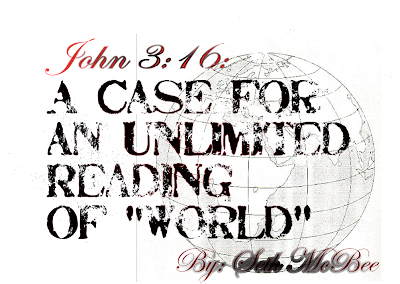Atonement Debate
One problem with this debate is that we both agree that Christ died to save the elect. Seth believes that Christ also died to do something for the reprobate. I don’t think that the Scriptures say so. Because I adhere to Sola Scriptura, as does Seth, I don’t believe doctrines unless Scripture teaches them.
I don’t suppose that Seth is asking me to find a verse that specifically denies his position. In other words, I don’t suppose that Seth is asking me to find the verse that says “Christ did nothing by his death for the reprobate” or “there was one purpose, and only one purpose to the atonement.” We can call this the “Prove the Bible doesn’t teach it” argument. Instead, I presume that Seth is asking me to present the best arguments in opposition to the doctrines of “multiple intentions” and the “universal atonement.” I don’t think Seth is intentionally trying to use the Prove the Bible doesn’t teach it argument.
In the first verse, which I’ll get back to in a bit, I went after the multiple intentions view with one of the stronger verses that demonstrates the purpose of God in giving his Son, namely to save all the believers.
Now, in the present verse I am demonstrating the same single purpose in another text. I could pick dozens of such verses, but this verse is significant for another reason. It is important because it tends to get cited a lot in these sort of debates. In fact, as much as the format permits, I had hoped to provide something of a softball – a verse that I expected Seth would be quite prepared on, as it has some linguistic similarity to his counter-thesis in this debate.
Can Seth Simply Agree with My Exegesis?
Seth wrote: “I could agree 100% with Turretinfan on his post and it does nothing to the implication of the Scriptures saying that Christ died for all, especially the elect. Even an Arminian could agree with what Turretinfan has posted.”
Well, of course, if Seth agrees, we can just move on to another verse. If Seth agrees, though, that’s one less verse out of the (how many verses are there in your Bible?) verses available from which to attempt to establish a doctrine of universal atonement and/or multiple intentions.
Seth’s right that “ No one is debating that Jesus or God is the Saviour of the elect, we are debating on whether Jesus died for all people.” Yet Seth’s wrong in stating: “Bnonn was correct in asking how this affects the debate in any way...it doesn't.” It does affect the debate, unless Seth’s position were to make the Prove the Bible doesn’t teach it argument.
Examining Seth’s Counter-Exegesis
Seth states: “I really don't completely agree with his thoughts on this.”
Ok, let’s see what Seth backs that disagreement with:
Seth: “The text in question is not saying that God is the preserver, which would be a verb, of the literal bodies, but is in fact stating that God is the Saviour, the noun, of all men.”
Of course, no, “preserver” is a noun, not a verb. Likewise “savior” is also a noun, and like “preserver” it is related to a verb. The related verb in Greek from which σωτήρ (soter – translated “Saviour” in this instance) is σώζω (sozo – usually translated “to save”). Besides all that, while we theologians may see “savior” and think immediately of salvation from eternal damnation, the term “savior” in English (as with soter in Greek) has a wide etymological range. Just consider the results here (link). My contention is that this verse is explaining that God – the preserver of all mankind – is the preserver of the elect in a special sense.
Seth: “He is the One that saves and Him alone.”
I answer: That’s true, but that’s not the point here (it is the point, for example, in 1 John 4:14 “And we have seen and do testify that the Father sent the Son to be the Saviour of the world” or in John 4:42 “And said unto the woman, Now we believe, not because of thy saying: for we have heard him ourselves, and know that this is indeed the Christ, the Saviour of the world.”). Here there is a pair of objects: “all men” and “the elect.” He is the One who saves all men, and he is the one who saves the elect.
Seth: “This doesn't imply that He carries this out for all men, which would be a verb form, but that He is in fact the only Saviour for all men.”
I answer: This noun-verb distinction is a slightly different one than in the previous instance, and presents a slightly different error. The error here is simply ipse dixit. Now, I’m sure Seth may not be the first or only person to say that. Furthermore, there’s some slight merit to Seth’s point, which I’ll point out before explaining why it’s insufficient.
The merit is this: if we had a verse that says (in active voice) God saves all men, that would be a more direct way of asserting such a fact than to say God is the Savior of all men. The combination of a being verb and a nominalization is a weaker way to say what is being said.
Furthermore, we can sometimes use a noun form to speak generally or gnomically. In other words, we can say “salvation is of the Jews” meaning that (before Pentacost) it was Jews generally (and generally only Jews) that were saved.
There’s one further tangent to address. It’s interesting (I think) that Seth identifies this use of “savior of all men” as a gnomic, general expression, but fails to consider that “save the kosmos” may be a gnomic, general expression. It seems to be based on the verb-noun false dichotomy, to which I will shortly return.
Nevertheless, whether noun forms (or verb forms for that matter) can be used gnomically, the fact that it is a noun form does not mean that it is merely gnomic. Consider how absurd it would be to interpret it that way in Luke 1:47: “And my spirit hath rejoiced in God my Saviour.” The speaker is affirming that God saved the person, not that God is simply out there as the only possible Savior.
Furthermore, Paul is not using “savior” in a merely gnomic sense here. How do I know? Because there are two objects: two saved groups. The first saved group is “all men” and the second is “those that believe.” Now, the two groups are connected by the term “malista.” That word can mean a variety of things, but the KJV has translated it “specially” and most modern translations generally agree, even if they use a slightly different word. There’s an argument to be made that they might all be wrong, but we’ll leave that aside for now.
In short, assuming the conventional interpretation of “malista,” to say that God is simply “the only Savior there is” for all men is not problematic, but to say that God is specially “the only Savior there is” for those that believe is a bit odd – both because how is it any more special? And because we are well aware that he is the actual savior in the eternal punishment sense, of believers.
Seth: “It would be like saying that no one can be saved apart from Christ. Neither of us would disagree with this.”
I answer: It would be like that, but only if one ignores the “specially of those that believe.”
Seth: “I actually find TF's use of Ephesians 5:23 to show the complete lack of understanding context in this verse.”
I answer: Oddly, I have a similar conclusion with one simply substitution. :)
Seth:
Here is the verse:
For the husband is the head of the wife, as Christ also is the head of the church, He Himself being the Savior of the body.
Ephesians 5:23
I answer:
Since I’m a textus receptus kind of guy, for me it’s:
Ephesians 5:23 For the husband is the head of the wife, even as Christ is the head of the church: and he is the saviour of the body.
There’s – to put it mildly – a bit of textual variation on the last phrase of that verse. It’s probably not worth arguing too much about the textual variant issue at this point, except to point out that the he is not necessarily referring to Christ, but could also reasonably be said to be referring to the husband (that seems to be how the KJV punctuates it). In any event, there is a parallel being drawn between the role of a husband toward his wife and the role of Christ toward the church.
It’s also important to note that Ephesians 5:23 is NOT the verse I selected. It’s simply an example I provided of the use of the term “savior” in a sense other than salvation from sins, in the new testament. I could simply have turned to the LXX at Psalm 27, first verse, or Psalm 62, second verse, or perhaps best of all for the purpose of our discussion, Psalm 65:5:
“Wonderful in righteousness; heed us, O God our deliverer! He is the hope of all the ends of the earth, and of the ones in the sea afar; the one preparing mountains in his strength, being girded with dominion; the one disturbing the extent of the sea; at the sounds of its waves who shall stand?” (Apostolic Greek Bible translation of LXX, form of “soter” in bold)
(or Psalm 79:9, 95:1, etc. etc.)
Alternatively, if the Psalms are too evidently both literal and typical, then simply refer to the descriptions of Othniel and Ehud in Judges 3.
I only mentioned it because someone in the comments had suggested that the Bible only uses “soter” “soteriologically” (ha! – there’s some kind of etymological commentary to be made here) meaning in the sense of being a savior from eternal punishment for sins (or something of that sort). It is used that way, frequently with explanation that it is that sort of meaning that is meant.
Here (in the verse we are actually considering, not Ephesians 5) Paul draws a distinction between the living God the general savior of all men (physical/temporal sense, if you will) and the living God the special savior of those that believe (spiritual/eternal sense, if you will).
Getting back to Ephesians 5, though, the passage is comparing Christ to the church using the simile of husband and wife. In the passage:
- wives submit to husbands (vs. 22) as the church to Christ (vs. 23) (repeated vs. 24)
- and the husband/Christ is the savior of the wife/body/church (vs. 23) (repeated with explanation in following vss.)
- husband/Christ loves wife/church (vss. 25-27)
- husbands love wives as husbands love their own bodies, nourishing and cherishing (vs. 28-29)
- Christ loves the church in an analogous way (vs. 30)
So, yes, the passage is speaking analogously about physical salvation/protection that the husband gives a wife (ought to, at any rate) as a simile to the spiritual salvation/protection that Christ gives Christians, with the actual force of the passage being primarily directed not to emphasize that Christ is our savior, but that husbands should emulate Christ and wives should emulate the church (notice how this discussion is bookended between the directions for church life generally (including mutual submission vs. 21) and the remaining family relations (children to parents 6:1-3, parents to children 6:4, slaves to masters 6:5-8, and masters to slaves 6:9).
Thus, the wife is the husband’s body, and it is his job to preserve it – just as he instinctively preserves his own body, and just as Christ graciously preserves the church (his body/wife by analogy).
I should have avoided that, I suppose, by quoting Psalm 65, or referring to Judges 3. Nevertheless, what’s done is done.
Seth: “The reference here is the comparison of the husband and wife, with Christ and the church. So when TF says that this is saying that Jesus is merely saving a "body" he misses the entire point of Ephesians 5. Christ is the Saviour of the church, the body, not merely a fleshly body as TF would purport.”
I answer: Presumably this comment is moot, in view of the demonstration above.
Seth: “Here is TF's comment in full in response to Bnonn and also TF's post that God is the Saviour of the bodies of all men.
You may be interested to consider/compare the usage of soter in Ephesians 5:23.
Eph 5:23 For the husband is the head of the wife, even as Christ is the head of the church: and he is the saviour of the body.
Or consider the use of related words such as "saved" (Jude 5, 2 Peter 2:5, or 1 Peter 3:20).
I answer: I think it’s important to point out that contrary to Seth’s statement “when TF says that this is saying that Jesus is merely saving a "body" he misses the entire point of Ephesians 5” I did not say that. I don’t think Seth intentionally misrepresented me, I think he just inferred something he shouldn’t have from my comment. It’s – unfortunately – not the first time that’s happened in our dialogue.
Seth: I will quickly add this. Jude 5, 2 Peter 2:5 and 1 Peter 3:20 all use the term "save" or a derivation of it in the verb form, not the noun form.
I answer: This “part of speech” argument is a bit like saying “there are more letters in that word than this one.” How so? Because it may be a true statement, but it is not a relevant statement. There is no special grammatical-exegetical significance to the fact that one word is a verb (in Jude 5, that’s a participle; in 2 Peter 2, it’s a different Greek verb altogether; and in 1 Peter 3:20 its an active indicative of a related verb with an emphatic particle attached) and another is a noun.
Seth: 1 Timothy 4:10 uses "soter" which is a noun and that is very big difference and the reason so many take 1 John 2:2 wrongly.
I answer: Seth is referring to the fact that hilasmos (propitiation) is used in 1 John 2:2, rather than hilaskomai (make propitious/make reconciliation) or some other verb form. Although it would be helpful in my debates with Arminians to agree with Seth’s noun/verb distinction, I cannot, because I am not persuaded it has any significant degree of merit. It would be a more direct way to say the matter, but that does not mean the indirect way doesn’t say the same thing. Nevertheless, we may find ourselves back on this verse (indirectly) in a few rounds.
Seth: “Even more so...1 Peter 3:20 speaks of "eight persons" being brought safely. TF uses this as kind of a proof text for 1 Timothy 4:10 and Ephesians 5:23, he might want to take a second look. The usage of "persons" in 1 Peter 3:20 is the Greek word "psuche" which means "soul" or "heart," NOT a physical body.”
I answer: The point I was making was a point from English. If I wanted to be contentious, I could point out that it was their physical lives that were preserved, via the mechanism of their “psuche” (breath) not being cut off by drowning in the flood waters, or simply point out that “souls” is simply an idiom for “people.” But that’s really neither here nor there.
Seth: “I actually believe that this comes from TF's continual ignoring the context in other discussions we have had.”
I answer: I feel like this somewhat overstates the point Seth is making, which is simply that he’s felt that way about my position in this debate and not as a general pattern over the years, or something like that. Naturally, as noted above, I think I can demonstrate that I deal more with the context than Seth does, and consequently I don’t think his label is accurate, even though I think he means it sincerely.
Seth next goes back to the discussion of John 3:16, but I’ll hold off for a second to get back to the actual verse I provided (providing the context):
I Timothy 4:1-10
1Now the Spirit speaketh expressly, that in the latter times some shall depart from the faith, giving heed to seducing spirits, and doctrines of devils; 2Speaking lies in hypocrisy; having their conscience seared with a hot iron; 3Forbidding to marry, and commanding to abstain from meats, which God hath created to be received with thanksgiving of them which believe and know the truth. 4For every creature of God is good, and nothing to be refused, if it be received with thanksgiving: 5For it is sanctified by the word of God and prayer. 6If thou put the brethren in remembrance of these things, thou shalt be a good minister of Jesus Christ, nourished up in the words of faith and of good doctrine, whereunto thou hast attained. 7But refuse profane and old wives' fables, and exercise thyself rather unto godliness. 8For bodily exercise profiteth little: but godliness is profitable unto all things, having promise of the life that now is, and of that which is to come. 9This is a faithful saying and worthy of all acceptation. 10For therefore we both labour and suffer reproach, because we trust in the living God, who is the Saviour of all men, specially of those that believe.
The flow of the passage is discussing the interaction between the physical and the spiritual.
- seducers will forbid marriage, prohibit consumption of food
- in contrast, food (and marriage) are good things, things created by God to be received with thanks, especially by believers who know the truth and who sanctify the food by knowledge of the word of God and prayer
- there is a parallel between physical nurture and spiritual nurture,
- which is why Timothy should not heed old wives tales, but good doctrine,
- because exercise is important, but godliness is much more important, because it has benefits both in this world and the next
- and after all, that’s why they preach, because they trust in the God who preserves the lives of all men and the eternal life of the elect.
Now, much of this discussion can be rendered mostly moot if Seth simply agrees, for Seth says that God is also something inbetween the two categories of “preserver of all life” and “preserver of the life of the elect.” You could say that Seth’s claim could be simply: “There’s more to God than that.”
Yet, by clearing up the sense of this verse, and properly understanding why it is not a supporting verse for “universal atonement” we can be better prepared to deal with other verses that may be alleged to support the universal atonement.
Seth: “Especially when he says that when John 3:16 says that "God so loved the world" this is speaking of the created order.
I answer: There’s been a substantial discussion about this (much of it here), let me try to summarize, since that link is about 30 pages of reading.
- The literal meaning of the word is “created order.” Lexicons say so, and you can check for yourself. That’s the general, literal sense of the word. It happens that it is that sense which is used in the first instance of “kosmos” in verse 17.
- That word is used by John (in this passage) to refer to the group of “all believers” in a general, global way. “The world” is used to denote a group that is “bigger” than simply the physical nation of Israel. In the context, Jesus is contrasting “ye” (Jewish leaders) with the “world.” There’s not an identity relationship between “world” and “all believers,” but there is a link – and that link is that the expression of God’s loving intent toward the world is in the salvation of the elect (all the believers).
Now, let me turn the exegetical table, and point out that you haven’t offered (that I noticed) any exegetical reason for arguing that the word means “all in unbelief.” So the counter question to you is:
How does someone derive the idea that “all the believers” is in a subset relation to “kosmos” (rather than, say, an explanatory relation) from the text itself?
Seth: Then, TF says that John switches from using the term "kosmos" as "created order" to then John using it figuratively in other places. (I am paraphrasing here so if TF needs to correct me, then so be it)
I answer: Sure, John uses “kosmos” literally sometimes, and figuratively sometimes. People do that with words.
Seth: “Is this not what we would deem as eisegesis instead of exegesis?”
I answer: No. We deem something to be eisegesis when it is not derived from the text. Different contexts often use the same word different ways. Does anyone seriously suppose that “God so loved the world” uses the words “love” and “world” in the same way that “If any man love the world” uses them? And yet it is the same author writing, and the same Greek words for “love” (agape) and “world” (kosmos).
Seth: “Especially in light of the fact that no major theologian, that I have found, would agree that this means "created order" here in John.”
I answer: That, of course, has nothing to do with whether it is exegetical or not – whether or not Seth is correct. I’ve already said enough about the counting reformed noses argument, in previous comments/posts.
Seth: 1. What does "created order" mean? And if you take John 3:16 to say that "God so loved the created order" then does this term, kosmos, switch meanings later in the same chapter? If so, why? Who is the judge of this? I am guessing it is our theological persuasion.
I answer: Hopefully this is mostly answered above. The context is the determiner of meaning. The literal meaning of kosmos is “created order,” which is why the English word “world” is used. The Created Order could be roughly equated to “The Creation” (the thing created, not the event) – and “world” is an adequate translation, except that it has become theologically loaded.
Of course, the precise meaning of “kosmos” is not at all critical to understanding the point of the text, which is that Christ was given to save the elect. That’s the undeniable meaning of the second and third phrases of the verse. Whatever “world” may refer to, Christ was given to save the elect. If it is supposed to convey here, as I think Owen concluded “the world of the elect,” such that the verse reads: “God so loved the world of the elect, that he gave his only begotten Son so that the elect would not perish but have eternal life,” then that makes great sense.
If it is supposed to mean “each and every person” then it creates discordance between the first and second half of the verse, because then the flow of the verse is that God loved “all” and therefore gave His Son to save “some.” That doesn’t make much sense, so we can discard it.
If it is means something in the middle like “Creation” (gnomically and in general) then that two makes sense, because the whole is blessed with reference to the part, in a sort of metonymic relationship.
That’s how exegesis works. You start from the clear, and work to the unclear. You don’t impose a figurative meaning on the word “world” and then try to make the rest of the verse fit.
Seth: 2. How does 1 Timothy 4:10 negate universal expiation? Not sure why you picked this verse as a strong argument.
I answer: I mostly picked it, as noted above, as a way to allow you to deal with a verse that I expected you might think was helpful. It also reemphasizes the fact that God is a Savior in the spiritual sense, only for the elect and not for all mankind.
Seth: 3. Do you really want to stand behind the fact that Ephesians 5:23 is speaking of a literal "body" or do you concede that this is speaking of the church? If so, how does 1 Peter 3:20 help your position...it seems to destroy it.
I answer: I think this is answered above. The answer is, of course, “both” to the first part of the question, and the answer to 1 Peter 3:20 is that – of course – it was physical, temporal salvation that the ark provided, and not salvation from eternal punishment.
-Turretinfan
Read More......



















